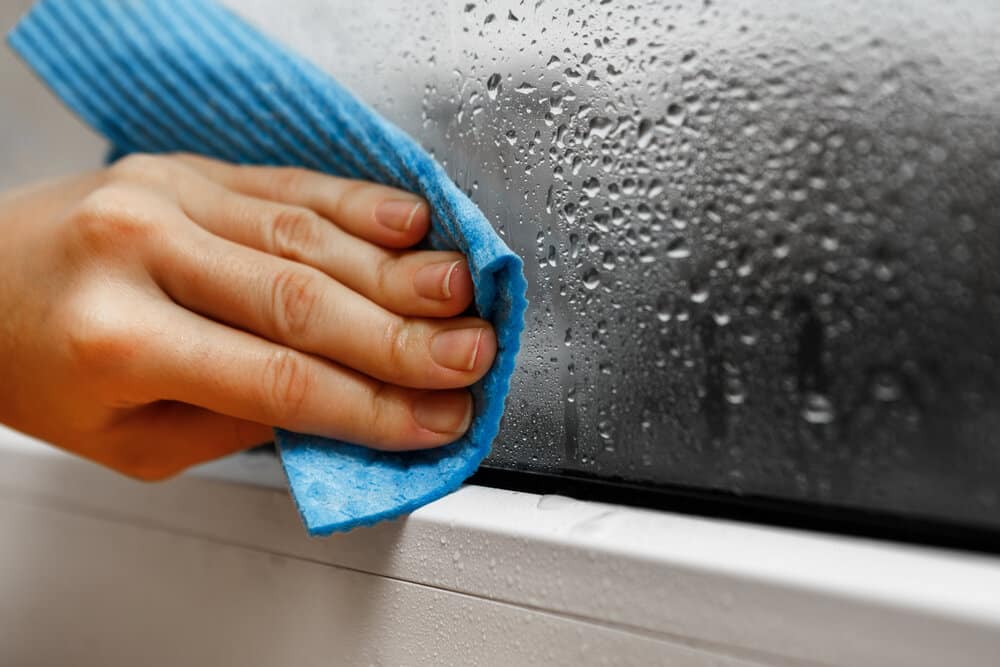
How To Lower Humidity In Your Home During Summer
The top three things you can do to lower the humidity in your home during the summer are
- Get a Dehumidifier,
- Take a Cold Shower,
- Turn on the Fans. These three things can make a big impact on reducing the overall humidity in your home today.
What do you like best about summer? Sitting outside under the sunshine with a refreshing drink? Playing games in the park until late in the evening?
There are so many amazing things we enjoy during the summer season. Yet, not everything is sunny in summer.
The high levels of humidity during the warmest weather is something nobody misses when fall arrives. You can’t even escape the humidity by going indoors. Or can you?
There are actually numerous ways to lower the humidity in your home. You need to know more about how to reduce humidity indoors.
Are you tired of getting frizzy hair? Do you want to conquer your sweaty brow?
Find out more about how to get rid of humidity to enjoy the summer once again. Check out our guide in the blog post below!
Why Does The Humidity Indoors Matter
You have probably heard people talk about “percentage humidity” before. That’s because the humidity is essentially the amount of moisture in the air.
When the air contains one hundred percent humidity, that means it must be raining. If you experience this indoors, you have a hole in your roof!
But, even under one hundred percent humidity can be a problem. When the temperature is high, the amount of moisture in the air can become a problem.
You may start to feel sluggish and tired during humid conditions. But there is more going on than you realize.
What Happens When Humidity Is High Or Low
When the humidity indoors is high, it affects more than your hair.
High humidity damages any wooden furniture in your home by increasing the risk of mold developing. The warm and wet conditions can also cause bacteria to grow inside your home.
Especially high or low humidity isn’t good for your health either. When you’re constantly breathing in humid air, you also risk developing respiratory problems.
When the humidity is too low, you can also heighten your risk of developing flu or colds. You may also show signs of itchy or sore skin.
What Humidity Levels Should Your Home Be
You need to find the right balance for the humidity in your home. The goldilocks of humidity!
According to the Environmental Protection Agency (EPA), that’s anywhere between 30% and 50% humidity.
So, whatever you do, definitely don’t allow your home to exceed 60% humidity. Remember, this is when the damage to your home and health becomes a serious risk.
Ready to learn more about how to reduce humidity in your home? Check out more below!
Get A Dehumidifier
Did you know that 13 percent of US households say that they use a dehumidifier? If you don’t already have one, you need one!
If you want to remove moisture from the air, buying a dehumidifier is a pretty straightforward solution.
How does it work?
It’s simple, really. Air is sucked through the device, and the water is collected in a container. You need to throw the excess water down the drain regularly.
You need to place the dehumidifier in the areas of your home with the biggest risk with moisture developing. Areas of your home that are especially vulnerable to dampness include the bathroom or basement.
However, since you may spend most of your time in the kitchen, bedroom, or living room of your home, you may want to prioritize this space with the dehumidifier instead.
Take A Cold Shower
Have you ever noticed when you take a hot shower that the air around the bathroom becomes humid? If you already have a problem with moisture in your home, this can make the conditions even worse.
The average American takes over 8 minutes in the shower. Of course, you’re going to exit the shower surrounded by steam if you take this long.
You need to cut down on how long you’re in the shower. But you also need to reduce the temperature to cut humidity in your home. So, that means shorter and cooler showers.
If you can, ensure that your bathroom is also ventilated. If you can open a window to allow the steam to leave the room, always do this when showering.
Turn On The Fans
Around 80 million US households have one or more fans. Fans can also help to reduce moisture inside.
When the fan is working, it spreads moisture around the room, which prevents the build-up of humidity in one place.
You can purchase small fans to put on surfaces or a standing fan. However, the most effective fans at reducing humidity are attached to the ceiling.
Moreover, if you’re cooking on the stovetop, you can turn on the exhaust fans. I don’t do this; standing over a boiling pot can quickly turn your home extremely humid.
Remove Any Houseplants
Many people promote the health and environmental benefits of indoor plants.
Yet you may be shocked to discover that they don’t help when your home gets humid. In fact, plants contribute to the moisture in your home.
When your greenery breathes in carbon dioxide, it also releases water into the atmosphere, hence why you need to keep watering it to keep it alive.
During the summer, you may want to put your houseplants outside for a while. Many houseplants may even benefit from the sunlight during warmer months.
If you can’t remove your houseplants because you don’t have any space outdoors, then ensure that they’re all located in a single room. This way, the humidity won’t spread throughout your home.
Properly Insulate Your Home
The EPA says that you could reduce your heating and cooling bills by up to 15 percent by properly insulating your home.
You may think mainly about the cash you could save. But, another neglected benefit of insulation for your home is also reducing humidity.
If your home is located in an especially humid climate, insulating your home can help to prevent this affected the inside.
When your home is effectively insulated, air from outside cannot enter your home, while the air inside cannot escape.
Most importantly, you need to ensure that the spaces that are especially vulnerable to moisture are insulated.
Wipe Up Water
When you wash up the dishes after dinner, do you leave splashes of water in the sink?
After you brush your teeth in the morning and before bed, does the water continue to drip into the washbasin?
You need to wipe any water left over. Otherwise, this water will evaporate into the air further causing humidity indoors.
Every time you use any water, ensure that you wipe up anything remaining to avoid worsening the humidity in your home.
Turn On The Air Conditioner
Up to 90 percent of American households have air conditioner systems. Your AC can be a lifesaver when humidity levels reach extremely high.
While running your air conditioner may not be as cheap as other tips, it’s probably the most effective choice. When you’re concerned that the temperature is high inside your home, turn on your air conditioner.
If you want to enjoy the benefits of an air conditioner, then you need to make sure your system is operating optimally. Check out these tips for a more efficient AC system.
Open The Window
Your home may even become more humid inside than it is outdoors. If this happens, you may want to open a window.
This should also cool down your home. Allowing the air to circulate rather than stay trapped indoors can help a lot.
The less humid air from outdoors will slightly reduce the level of humidity inside your home.
However, if the air conditioner is turned on, you shouldn’t open the window. This will only cause the cold air to blow outside.
Check Your Gutters Are Clean
Are there any water leaks in your home?
In many cases, this is caused by problems with your gutters. It’s important to ensure that your home’s gutters are cleaned and cleared regularly.
Hang Your Laundry Outside To Dry
During the summer, you don’t have to waste energy on your dryer. You can hang your laundry outside to dry in the sun.
However, many people also hang clothes indoors, even in the summer. When you allow your damp clothes to dry indoors, the moisture spreads throughout your home.
Hanging your clothes outdoors can help to avoid making your home even more humid during the summer.
How To Reduce Humidity
If you want to know how to reduce humidity in your home, you shouldn’t be at a loss. There are many ways to get rid of moisture from inside your home.
Do you want to discover more about how to lower humidity in the house? Get in touch with us for help and advice!
